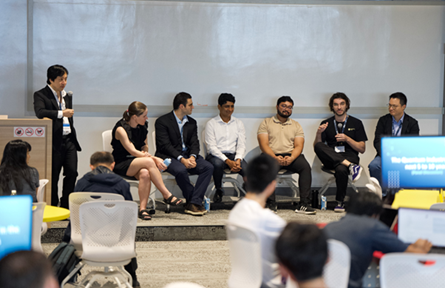Quantum and Topological Nanophotonics Workshop (QTN 2024)
Das Trishita | PhD Student, School of Physical and Mathematical Sciences NTU
The Quantum and Topological Nanophotonics Workshop (QTN 2024) took place at the Singapore Hokkien Huay Kuan Building Auditorium, NTU from 19 to 21 November 2024. This prestigious event, organised by the Centre for Disruptive Photonic Technologies (CDPT), marked the fifth edition of the series and upheld its reputation as one of the leading platforms for discussing advancements in quantum and topological nanophotonics.
QTN is conceived as an international workshop featuring invited-only speakers of high international caliber and is open to Singapore research community. Past editions were co-organised with renowned institutions worldwide: the Institute of Photonic Sciences (ICFO), Spain (QTN 2016), the Seoul National University, Korea (QTN 2018), Caltech and Stanford University, USA (QTN 2019), the City University of New York, Columbia University and University of Pennsylvania, USA (2022). QTN 2024 was co-organised with ETH Zürich and École Polytechnique Fédérale de Lausanne (EPFL), Switzerland.
The workshop was well supported by sponsors and collaborators, including the Institute of Advanced Studies, the College of Science, the School of Physical and Mathematical Sciences, and the National Centre for Advanced Integrated Photonics.

Spread over three days, the event combined groundbreaking research presentations, in-depth discussions, and collaborative networking opportunities. Key events included: the IAS Keynote Talks, delivered by prominent scientists, Prof Romain Quidant (ETH) and Prof Javier Garcia de Abajo (ICFO), offering insights into innovative developments in nanophotonics and quantum systems; the fire-pitch poster presentations, a vibrant platform for emerging researchers to display their work, culminating in the announcement of four IAS best poster awards; the session on integrated QTN, focused on photonic device integration for next-generation quantum communication and sensing applications. The event concluded with a special session and closing remarks at the Asian Civilisations Museum, emphasising the fusion of science and culture.
The workshop featured 30 invited talks that provided an incredible overview on the forefront and emerging topics in nanophotonics research, and speakers felt at ease in presenting last minute, unpublished results. We heard groundbreaking achievements in levitated optomechanics, optomechanical metamaterials, quantum emitters and superconducting nanowire single photon detectors, topological photonics and integrated photonics and metasurfaces spanning from the visible to the THz spectral range. We learned about less conventional research area in photonics, such as free-electron quantum nanophotonics, non-Hermitian photonics and photonic skyrmions, as well as unusual concepts such as photonics equivalent of axions and time crystals.

Audience members deeply engaged by the QTN 2024 invited speakers.
QTN was a great platform for young researchers and students to engage with leading researchers. The coffee/tea and lunches gave the chance to engage in one-to-one conversations and allowed graduate students to speak to the pioneers of their fields and gain much exposure to the frontiers of their research areas. The two fire-pitch poster sessions were an excellent opportunity for students and research fellows to present their findings to the audience and the international experts. I personally felt very glad to be able to present my own research work to such an outstanding crowd.
In my opinion, QTN 2024 solidified its position as a premier platform for fostering collaboration and sparking new ideas in the rapidly evolving fields of quantum and topological nanophotonics and I am confident the workshop was a gateway for the establishment of new research partnerships and the exchange of transformative ideas, paving the way for future advancements in photonics.














/enri-thumbnails/careeropportunities1f0caf1c-a12d-479c-be7c-3c04e085c617.tmb-mega-menu.jpg?Culture=en&sfvrsn=d7261e3b_1)

/cradle-thumbnails/research-capabilities1516d0ba63aa44f0b4ee77a8c05263b2.tmb-mega-menu.jpg?Culture=en&sfvrsn=1bc94f8_1)






